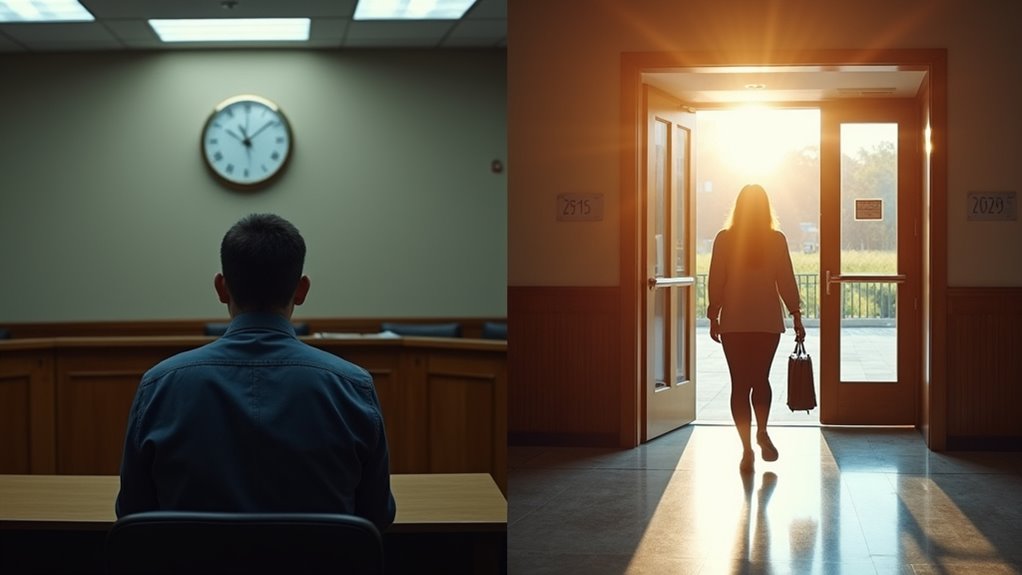Whether a plea deal is worth taking in 2025 depends heavily on your specific circumstances. While plea bargains offer significant benefits like reduced sentences and faster case resolution, they’ll create a permanent criminal record that can restrict your future employment, housing, and civil rights. You’ll need to weigh the immediate advantages of avoiding trial against the long-term consequences. Understanding the full scope of plea bargaining’s impacts will help you make this critical decision.
The Current State of Plea Bargaining Statistics

The overwhelming majority of criminal cases in the U.S. justice system never make it to trial, with an astounding 98% of federal convictions and 95% of state convictions resulting from plea bargains. This reality reflects a system that prioritizes efficiency and cost savings over traditional adversarial court proceedings. A variety of plea bargain types exist, including charge bargaining, sentence bargaining, and count bargaining.
You’ll find that over 70% of these plea cases involve agreements requiring judicial approval, whether binding or nonbinding. Prosecutor influence plays a significant role in this process, as they can offer reduced charges or favorable sentences in exchange for guilty pleas.
Pretrial detention considerations often pressure defendants to accept plea deals rather than await trial while incarcerated. Those who choose to exercise their right to trial face sentences 57% longer than defendants who accept plea deals. The system’s emphasis on rapid case resolution has effectively transformed plea bargaining from an alternative to trials into the primary method of case disposition in American criminal justice.
Understanding Your Rights and Options

Understanding your legal rights during plea negotiations requires thoughtful contemplation of evolving federal and state reforms in 2025. You’ll need to evaluate alternative sentencing options, including restorative justice programs, treatment diversion, and mental health courts that may offer better outcomes than traditional incarceration. Growing concerns over political influence at the Department of Justice may impact how prosecutors approach plea negotiations.
Recent legislation like the First Step Act has demonstrated that reduced sentences can lead to lower recidivism rates for drug-related offenses. Your rights extend beyond simple guilty/not guilty choices. New judicial discretion impacts mean you can potentially access expanded expungement opportunities, participate in victim-offender mediation, or qualify for specialized diversion programs. You should meticulously weigh these options against proposed federal sentencing guidelines and mandatory minimums.
Local prosecutorial policies may affect your plea deal terms, particularly in cases involving drugs or firearms. Moreover, you’ll want to ponder how post-conviction relief options and state-specific programs might influence your long-term prospects before accepting any plea arrangement.
Key Benefits of Accepting a Plea Deal

Accepting a plea deal offers several compelling advantages that warrant careful consideration in 2025’s evolving legal terrain. The advantages of pre-determined penalties eliminate uncertainty about your case’s outcome, as you’ll know the exact consequences upfront rather than facing unpredictable trial verdicts.
You’ll benefit from prosecutors’ plea discount incentives, which typically result in lighter sentences and reduced charges compared to trial convictions. The process moves materially faster than a full trial, often concluding within months rather than years. Statistics show that over 90 percent of Maryland criminal cases are resolved through plea agreements. You’ll also experience less emotional strain by avoiding lengthy court proceedings and public exposure.
Additionally, you’ll save substantial resources through reduced legal fees and court costs. With 98% of convictions resulting from pleas, this streamlined approach has become the predominant method for resolving criminal cases efficiently. The system provides important cost savings and efficiency benefits for both defendants and the courts while offering more predictable outcomes.
Hidden Risks and Long-Term Consequences
Your acceptance of a plea deal creates a permanent criminal record that won’t disappear with time. This record can severely restrict your future employment opportunities, as many employers conduct background checks and automatically screen out candidates with criminal histories.
You’ll face ongoing barriers to career advancement, professional licensing, and certain industry sectors, potentially limiting your earning potential for decades to come. Research shows that approximately 2 out of 10 defendants accept plea deals when faced with potential death penalty charges. The modern justice system heavily relies on these agreements, with less than 3% of federal criminal cases going to trial.
Criminal Record Permanence
While plea deals may offer immediate relief from pending charges, the permanent consequences of a criminal record extend far beyond the courtroom and initial sentencing. Without proper plea negotiation transparency, you’ll face lasting barriers that can fundamentally alter your life trajectory, even if criminal history expungement becomes available.
Consider these enduring impacts of accepting a plea deal:
- Your voting rights and ability to hold public office may be permanently stripped away
- You’ll face lifetime restrictions on firearm ownership, especially for violent offenses
- Immigration consequences can trigger deportation or prevent future legal entry
- Professional licenses and career opportunities become severely limited
- Access to public housing, benefits, and certain federal programs remains restricted
Criminal records can make obtaining housing incredibly difficult as landlord background checks routinely screen out applicants with prior convictions, forcing many to settle for substandard living conditions.
Even with a nonviolent misdemeanor, you must wait five years after completing your sentence before becoming eligible for expungement.
These consequences persist long after serving your sentence, making thorough consideration of plea agreements vital before acceptance.
Future Employment Barriers
Employment barriers represent one of the most severe and far-reaching consequences of plea deal convictions in 2025. Background checks now reveal criminal records regardless of the plea’s severity, creating permanent employment barriers that affect career trajectories. You’ll face heightened scrutiny during hiring processes, as employers routinely screen candidates for any criminal history. Since a plea deal has identical consequences as a standard conviction, employers treat them the same way during screenings.
Long-term career impacts extend beyond initial hiring decisions. Professional licensing boards may deny certifications in regulated fields like healthcare, finance, and education. Even if you secure employment, advancement opportunities often become limited, particularly in roles requiring security clearances or public trust. Employer reevaluation of staff performance, including consideration for pay raises and promotions, can be negatively influenced by past convictions.
Corporate policies frequently restrict promotion paths for those with criminal records, while regulated industries maintain strict compliance standards that exclude candidates with convictions. These employment barriers persist across sectors, fundamentally altering career prospects.
How to Evaluate if a Plea Deal Makes Sense
Evaluating whether to accept a plea deal requires carefully weighing multiple factors against the risks and potential outcomes of going to trial. Your evidence assessment must consider prosecution strength, defense strategy evaluation, and potential trial outcomes.
Remember that judicial review is required before any plea agreement becomes final, providing an additional layer of scrutiny to ensure the deal is fair and just.
Key considerations when deciding if a plea deal makes sense:
Prosecutors are now prohibited from using criminal charges to coerce defendants into accepting plea agreements, which strengthens your position in negotiations.
- You’ll need to weigh the emotional toll of a lengthy trial against the certainty of a negotiated resolution
- Consider your financial capacity to sustain legal fees through trial versus plea costs
- Evaluate how collateral consequences might impact your future opportunities
- Assess the strength of prosecution evidence and likelihood of conviction
- Compare proposed plea terms against typical sentences for similar cases
What Reform Changes Mean for Defendants
Recent reform initiatives will give you stronger protections when considering plea deals, including mandatory documentation of negotiations and expanded access to defense resources. You’ll benefit from new limits on sentencing disparities between plea and trial outcomes, which reduce the coercive pressure to accept unfavorable deals.
However, you should note that Project 2025’s proposed rollback of federal oversight could weaken these safeguards, particularly if you’re facing prosecution in jurisdictions with historically problematic practices. More jurisdictions are now implementing citation by default policies for low-level offenses, giving defendants better leverage in plea negotiations.
New Defendant Safeguards Explained
Five major reforms have strengthened defendant protections in plea negotiations for 2025, marking a significant shift in criminal justice safeguards. These changes guarantee fair representation and ethical negotiations throughout the plea bargaining process, fundamentally transforming how you’ll navigate criminal proceedings.
- You’re now guaranteed mandatory legal counsel who must thoroughly evaluate evidence and explain long-term consequences
- Your constitutional rights remain protected unless explicitly waived, with strict oversight against coercion
- You’ll receive complete transparency about charges, evidence, and maximum penalties before making decisions
- Courts actively monitor plea validity and can reject deals that appear coercive or disproportionate
- You retain appeal rights even after accepting a plea, with mechanisms to challenge wrongful convictions
These safeguards create a more balanced system, warranting your interests remain protected throughout the plea bargaining process.
Comparing Pre/Post Reform Outcomes
Dramatic reforms in plea bargaining have fundamentally shifted outcomes for defendants between pre-2025 and post-2025 systems. You’ll now find mandatory recording requirements, detailed documentation of negotiations, and clearer sentencing guidelines that bolster evidence transparency and procedural fairness.
Pre-reform, you faced potential coercion through trial penalties and unclear terms, with prosecutors wielding disproportionate sentencing threats. Post-reform, you’ll encounter a system with built-in safeguards: written agreements, recorded discussions, and proportionate sentencing ranges.
The reforms have particularly benefited marginalized communities by implementing oversight bodies and proportionality reviews to combat discriminatory practices.
These changes mean you can make more informed decisions about plea offers, with reduced pressure to accept unfavorable deals and better protection of your constitutional rights.
Frequently Asked Questions
Can I Negotiate Multiple Plea Deals Before Accepting One?
Yes, you can negotiate multiple plea deals simultaneously before accepting one. However, you should discuss potential downsides with your attorney, as revealing information during negotiations could be used against you if deals fall through.
It’s wise to investigate alternative strategies and compare offers carefully, as each negotiation may impact others. Your attorney can help utilize competing offers to secure better terms while managing risks across multiple negotiations.
What Happens if My Co-Defendant Takes a Plea but I Don’t?
If your co-defendant takes a plea and you don’t, you’ll face several critical consequences. They might testify against you as part of their deal, strengthening the prosecution’s case.
You’ll likely face harsher charges and increased pressure to accept a plea yourself. Your legal strategy will need to adapt, especially if their testimony introduces new evidence.
The judge may also view your case more skeptically since your co-defendant has admitted guilt.
Do Plea Deals Affect My Ability to Get a Job Abroad?
Plea deals can profoundly influence your international job prospects. Your visa application process may be convoluted, as many countries perceive plea deals as criminal convictions. You’ll need to disclose these during background checks, and some nations may refuse work permits based on any criminal record.
Professional licensing abroad, especially in fields like law, medicine, or finance, could be limited. It’s vital to contemplate long-term career ramifications before accepting a plea agreement.
Can I Withdraw From a Plea Deal After Initially Accepting It?
You can withdraw from a plea deal, but your timing is vital. Before court acceptance, you’ll have the most flexibility to rescind, especially if you lacked legal counsel or new evidence emerges.
After court acceptance but before sentencing, you’ll need to show a “fair and just reason” for withdrawal. Post-sentencing withdrawals are considerably more challenging and require proving serious issues like constitutional violations or ineffective counsel.
Each stage has specific legal procedures and deadlines.
How Do Plea Deals Impact Future Immigration Status and Travel Visas?
Plea deals can severely impact your immigration status and travel options. Even minor convictions can trigger deportation risk for permanent residents and visa holders. You’ll face potential visa revocation, reentry restrictions, and inadmissibility issues for future travel.
Criminal record expungement may not help with immigration consequences, as federal authorities can still access expunged records. It’s pivotal to consult an immigration attorney before accepting any plea deal to understand long-term implications.

